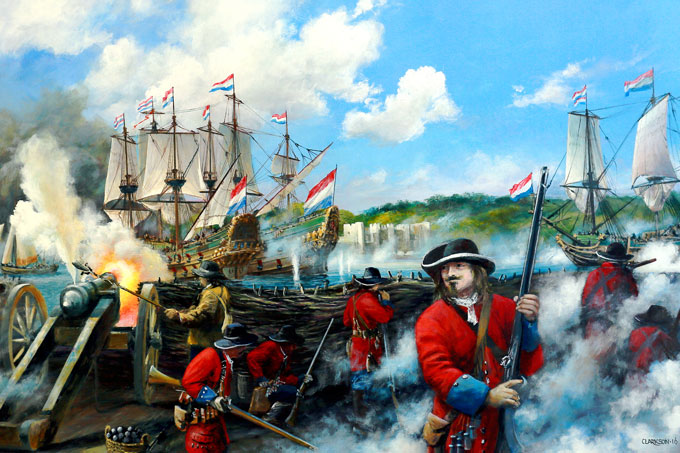Dr Keith McLay explores the events surrounding this month’s Raid on the Medway commemorations.
This summer marks the 350th anniversary of the Raid on the Medway. The historic incursion, in which the Dutch launched a successful and daring assault on the English, engulfed the Medway in flames, and is generally regarded as one of country’s greatest naval disasters.
The Dutch Navy’s raid on the Medway anchorages of Chatham and Gillingham on 12 June 1667, led by the celebrated Admiral, Michiel de Ruyter, was daring and unexpected.
The Dutch come so close to London as to set off widespread panic throughout the city, prompting people to send their most valued possessions out of the city for fear of imminent occupation by Dutch forces, and King Charles II to cease his future war plans and seek peace. Most humiliating of all the Royal Navy’s flagship, HMS Royal Charles, which only seven years previously had carried a triumphant Charles home from exile to restoration on the thrones of British Isles, was carried off by the Dutch.
Historians typically view the early-to-mid 17th century as the ‘Golden Age’ for the Dutch United Provinces (the seven provinces which we know today as the Netherlands). Then the dominant European naval power by far, its Admiralty protected far flung mercantile and commercial interests overseas.
England had challenged Dutch supremacy some 12 years previously during the First Anglo-Dutch War (1653-1654). However, mercantile tensions, particularly with respect to overseas trade and settlements, remained. Indeed, within a decade, these commercial, mercantile and colonial disputes combined to be the wellsprings for a second war.
The Raid on the Medway proved to be the final act in the Second Anglo-Dutch War (1665-1667). It had been long in the planning. Indeed, De Ruyter’s intent prior to the final naval battle (the St James’s Day engagement) of the Second Anglo-Dutch-War, in July 1666, had been to lead to an expeditionary force to destroy the Royal Navy while the bulk of its vessels lay at its Chatham anchorage being repaired. But frustrated by the summer weather of 1666, the failure of the French to make good on their promised support and the English fleet weighing anchor ahead of time, the Dutch returned to their blueprint for attack in May 1667.
On this occasion, they were assisted by an empty English Exchequer causing the majority of the larger English ships to be laid up at the Chatham anchorage and the Court being deaf to intelligence which suggested that such an attack was likely. The latter also contributed to the lack of defensive counter-measures along the Medway estuary and in front of the Chatham and Gillingham dockyards.
When the Dutch fleet reached the Isle of Sheppey on 10 June, it made light work of the unfinished fortification Garrison Point and was able to turn into the estuary largely unimpeded.
Now realising the gravity of the situation, overnight the King ordered the ‘Gillingham Chain’ in front of the Chatham anchorage be bolstered. As we know from Samuel Pepys’ diary, it was nonetheless too little too late. On 12 June, the chain was broken and the Dutch wreaked havoc among the Royal Navy’s anchorages with some 13 ships lost and two, including HMS Royal Charles, towed away.
The successful raid proved precipitous. Almost immediately, the King ordered the signing of the peace treaty, which had been discussed for some months at Breda. Notwithstanding the English gains in the Treaty, such as New York, Pepys astutely captured the impact of the Raid on the Medway. Writing in his diary on 29 July, just prior to the signing of peace, he noted: “Thus in all things…the Dutch have the best of us, and do end the war with victory on their side.”
You can read a more detailed review of the Raid on the Medway by Dr Keith McLay in the latest edition of the University’s magazine, Inspire, and find out more about the events and activities to commemorate the 350th anniversary of the battle here.
Dr Keith McLay is Dean of the Faculty of Arts and Humanities and an early modern military and naval historian.
Image copyright Kevin Clarkson and reproduced by kind permission of the artist (Kevin Clarkson) and the Guildhall Museum, Rochester.
 Expert comment
Expert comment Jeanette Earl
Jeanette Earl 1613
1613


